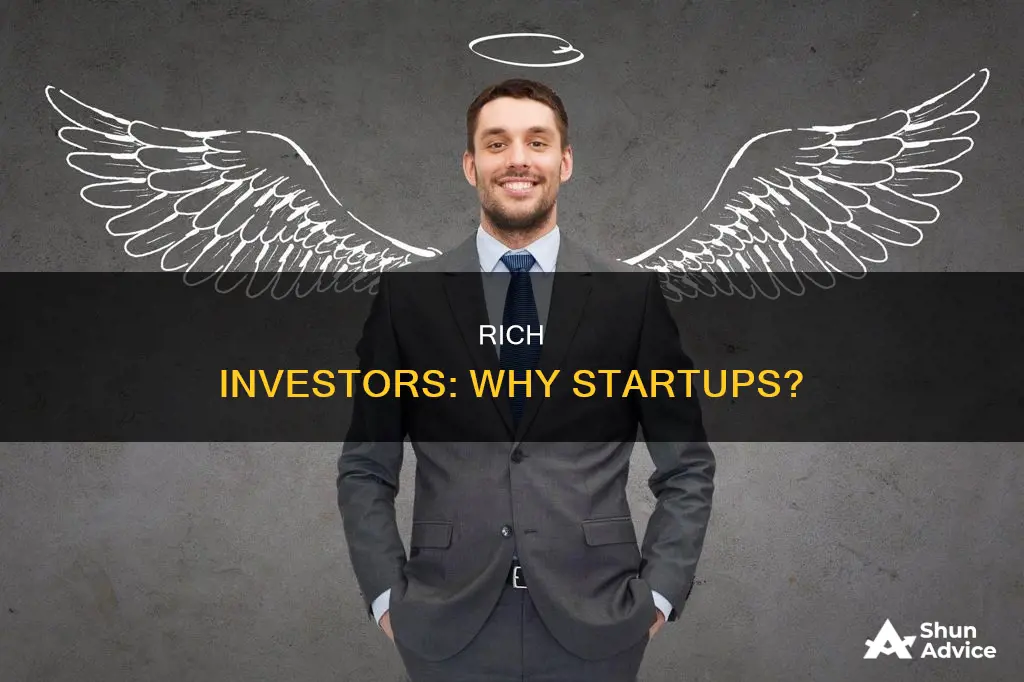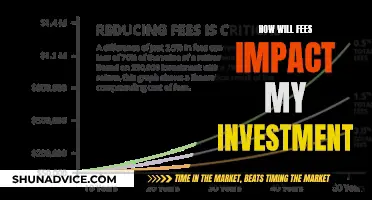
Investing in startups is a risky business, but it can also be lucrative. Rich people may be attracted to the high-risk, high-reward nature of investing in startups, and the potential for exponential growth. While the majority of startups fail, those that succeed can produce very high returns on investment, with some investors multiplying their initial investment by more than 300 times. In addition, investing in startups can provide a sense of personal fulfillment, as investors get to be part of something exciting and innovative, and support entrepreneurs pursuing new ideas.
| Characteristics | Values |
|---|---|
| High-risk, high-reward | Returns can be in the thousands of percent |
| Diversification | Investors should make several small investments in different startups |
| Belief in a new idea | Investors want to see something new in the world |
| Personal connections | Investors are in a network and are supportive of a project they know |
| A sense of fulfillment | Investors do it for the feeling of helping someone found a business |
What You'll Learn

High-Risk, High-Reward Opportunities
Investing in startups is a risky business. The majority of new companies, products, and ideas simply do not make it, so the risk of losing one's entire investment is a real possibility. However, the potential for high returns is also very real. For those that go public, the returns can be in the thousands of percent, making early investors very wealthy indeed.
A startup goes through several stages, and each one offers distinct opportunities and risks for investors. In the first phase, the founders do not yet have a working product, a customer base, or a revenue stream. Many startups begin with seed money from founders, friends, and family (FF&F). The sums are generally small and allow an entrepreneur to prove that an idea has a good chance of succeeding. During this seed phase, the first employees may be hired and prototypes developed to pitch the company's idea to potential customers or later investors.
Once a new company moves into operations and starts collecting some initial revenue, it has progressed from seed to bona fide startup. At this point, company founders may pitch their ideas to angel investors. An angel investor is usually a wealthy private individual who specializes in investing in early-stage companies. Angel investments are typically modest in size, but the company's future prospects are at their riskiest stage.
By the third stage, the founders should have developed a solid business plan. Although the company is not yet earning any net profits, it is gaining momentum and reinvesting any revenues back into the company for growth. This is when venture capital steps in. Venture capital can come from an individual, a private partnership, or a pooled investment fund. Most demand an active role in promising new companies that have moved past the seed and angel stages. Additional rounds of venture capital may be sought as the company continues to burn through cash in pursuit of exponential growth.
The extreme level of risk inherent in new companies means that not only will most venture capital investments fail, but a host of unique risk factors must also be addressed when considering a new investment in a startup. For example, will the company have grown enough to launch a successful IPO and provide a solid return on investment for its investors? Will the financial markets welcome this concept in five or ten years when the company is ready to launch an IPO?
Despite the risks, the potential for high returns makes investing in startups an attractive prospect. If an investor ends up putting their cash into a successful startup that eventually gets bought or goes public, they could multiply their cash over just a few years. This could be like turning $2,000 into $20,000 to $40,000. And if they get extremely lucky, they might multiply their investment by more than 300 times.
However, these are best-case scenarios, and because the area is so new, there is not much reliable data on what kind of average payouts to expect. Most startups fail—about half don't even make it to four years. And even if they do succeed, the value of an investor's equity in the company might not be realized for years, if ever. As such, investing in startups is not for everyone, least of all investors who want low risk and reliable income.
Retirement and Investment Trends
You may want to see also

Belief in a New Idea
Investing in startups is a risky business. The majority of new companies, products, and ideas simply do not make it, so the risk of losing one's entire investment is very real. However, for those that do go public, the returns can be in the thousands of percent, making early investors very wealthy indeed.
For rich people, investing in startups is not about becoming richer, but rather about building capital for a group of people or organizations. This newly acquired power can then be used to drive the change most want to see in the world.
Startups are about entrepreneurs pursuing a new idea. People often invest in what they want to see in the world, whether it's more sustainability, a really cool sneaker company, or something else entirely. There's no better opportunity to see something that you want in the world and to support that.
Investing in startups gives one a ringside seat to solutions for challenging problems or the development of new technologies. If a startup succeeds, the sky's the limit. There's so much opportunity for expansion and an enormous multiplier effect that could be huge.
Additionally, investing in startups can be personally fulfilling. For some investors, it's about helping someone found a business, watching something new get created, learning about different industries, or getting in on the ground floor of something exciting.
Millions Have $1M to Invest
You may want to see also

Personal Connections
Many startup investments are made through personal connections, such as friends or family members who are launching innovative products or services. This type of investment is often driven by a desire to support a project that is close to home and to help someone in their network. It's about more than just financial gains; it's also about fostering a sense of community and being part of something exciting.
Investing in a startup founded by someone you know can be a rewarding experience. It allows investors to feel connected to the project and provides an opportunity to contribute to its success. This type of investment may also offer a level of trust and transparency that is unique to personal connections.
Additionally, personal connections can provide access to exclusive investment opportunities. For example, angel investors—typically private individuals with accumulated wealth—often invest in early-stage companies founded by people they know. These investors not only provide financial support but may also offer mentorship and guidance, drawing on their own experiences and networks.
Furthermore, personal connections can play a crucial role in due diligence, which is essential when considering startup investments. Investors who have personal ties to the founders may have a better understanding of the team's passion, skills, and drive. They can assess the founders' personalities and capabilities, which are critical factors in the success of a startup.
When it comes to investing in startups, it's not just about the numbers; personal connections can make all the difference. Whether it's through supporting a friend's venture or leveraging one's network to access exclusive opportunities, personal connections can provide a competitive edge in the world of startup investing.
Investing: Personal Definitions of Risk and Reward
You may want to see also

A Sense of Fulfillment
Investing in startups can be a risky business, with the majority of new companies failing to make it. However, for some investors, it's not just about the potential financial gains but also the sense of fulfillment that comes with it.
Startup investing is about entrepreneurs pursuing a new idea, and for many investors, it's an opportunity to be a part of something exciting and innovative. It gives them a sense of fulfillment to help someone found a business, watch something new being created, and learn about different industries.
Investing in startups provides a ringside seat to witness the development of solutions for challenging problems or the creation of new technologies. It offers a sense of involvement and contribution to the process of turning an idea into a thriving business.
Additionally, startup investing allows investors to diversify their portfolios and potentially generate high returns. While most startups fail, those that succeed can provide significant financial gains. It's a high-risk, high-reward opportunity that appeals to investors seeking substantial growth potential.
Furthermore, the "stacking effect" in profitable startups can lead to consistent wealth accumulation over time. This effect occurs when yearly profits increase and stack in the bank, even without requiring massive exits or IPOs.
In conclusion, investing in startups provides a sense of fulfillment for investors who value being part of innovative ventures and witnessing the creation and growth of new businesses. It combines the potential for financial gains with the excitement of contributing to something new and potentially transformative.
Seeking Investors for Your Farm?
You may want to see also

Potential for Exponential Growth
Investing in startups is a risky business. The majority of new companies, products, and ideas simply do not make it, so the risk of losing one's entire investment is very real. However, the potential for exponential growth is what attracts investors to startups. If you pick a successful startup, the sky's the limit. There is an enormous multiplier effect that could be huge. This is what an investor would be buying into.
Startups are in the idea phase and do not yet have a working product, customer base, or revenue stream. During the seed phase, the first employees may be hired and prototypes developed to pitch the company's idea to potential customers or later investors. The money invested can be used for performing market research and other tasks that help validate a founder's proposal.
Once a new company moves into operations and starts collecting some initial revenue, it has progressed from seed to bona fide startup. At this point, company founders may pitch their ideas to angel investors. Angel investors are typically the first source of funding outside of FF&F (founders, friends, and family) money. Angel investments are typically modest in size. At this point, the company's future prospects are at their riskiest stage. Angel money may be used to support initial marketing efforts and move a prototype into production.
By this point, the founders should have developed a solid business plan that dictates the business strategy and projections going forward. Although the company is not yet earning any net profits, it is gaining momentum and reinvesting any revenues back into the company for growth. This is when venture capital steps in. Venture capital can come from an individual, a private partnership, or a pooled investment fund. Most demand an active role in promising new companies that have moved past the seed and angel stages.
Additional rounds of venture capital may be sought as the company continues to burn through cash in order to achieve the exponential growth expected by venture capital investors. The ideal exit strategy is for the company to go public via an initial public offering (IPO), which can generate outsized returns for those who take these risks. For those that do go public, the returns can be in the thousands of percent, making early investors very wealthy indeed.
Measuring Investment: People Over Profits
You may want to see also
Frequently asked questions
Rich people invest in startups for a variety of reasons. Firstly, they may believe in the new idea or innovation that the startup is pursuing, and want to support its development and potential positive impact on the world. Secondly, there is a sense of fulfillment that comes from helping someone found a business and watch it grow. Thirdly, investing in startups offers the potential for high returns and exponential growth, which is rarely seen in more established, large-cap stocks. Lastly, rich people may have personal connections to the startup founders and want to support their projects.
Investing in startups is a risky business, as the majority of new companies fail. There is a high possibility of losing one's entire investment. Startups are also illiquid investments, meaning it can be difficult to sell shares or exit the investment quickly. Additionally, it may take years to see results or generate returns on the investment.
Despite the risks, investing in startups can offer several benefits. Firstly, startups have the potential for high growth and exponential returns, which can make early investors very wealthy. Secondly, investing in startups allows individuals to be a part of innovative ideas and support entrepreneurs pursuing their passions. Lastly, investing in startups provides diversification to one's investment portfolio, reducing overall risk.
Rich people can invest in startups through several avenues. They may choose to become angel investors, who provide funding to early-stage startups and often take on advisory roles. Another option is to invest in venture capital funds, which pool money from multiple investors to diversify risk across a portfolio of startups. Additionally, crowdfunding platforms have made it possible for anyone to invest in startups, providing an opportunity for rich individuals to invest smaller amounts across a diverse range of startup companies.







